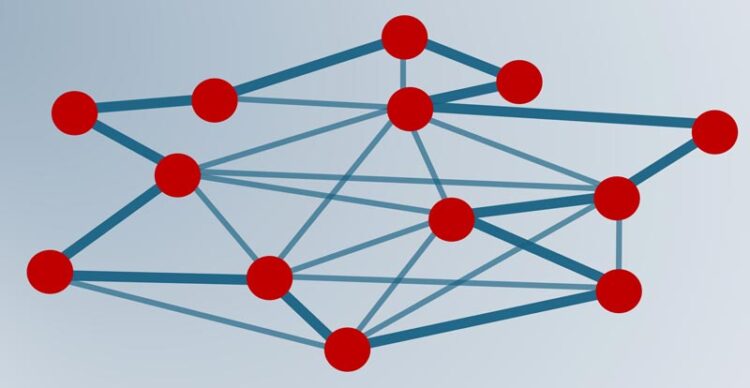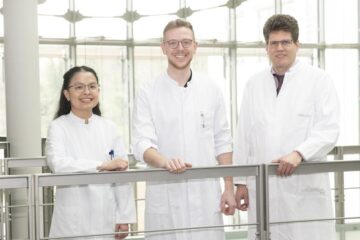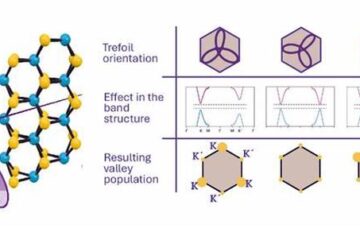Where quantum computers can score

The travelling salesman's problem is a classic in mathematics. A traveller is to visit N cities by the shortest route and return to the starting point. As the number N increases, the number of possible routes explodes. This problem can then be solved using approximation methods. Quantum computers could provide significantly better solutions more quickly. © HZB
The travelling salesman problem is considered a prime example of a combinatorial optimisation problem. Now a Berlin team led by theoretical physicist Prof. Dr. Jens Eisert of Freie Universität Berlin and HZB has shown that a certain class of such problems can actually be solved better and much faster with quantum computers than with conventional methods.
The present work (arrow) shows that a certain part of the combinatorial problems can be solved much better with quantum computers, possibly even exactly. © HZB/Eisert
Quantum computers use so-called qubits, which are not either zero or one as in conventional logic circuits, but can take on any value in between. These qubits are realised by highly cooled atoms, ions or superconducting circuits, and it is still physically very complex to build a quantum computer with many qubits. However, mathematical methods can already be used to explore what fault-tolerant quantum computers could achieve in the future. “There are a lot of myths about it, and sometimes a certain amount of hot air and hype. But we have approached the issue rigorously, using mathematical methods, and delivered solid results on the subject. Above all, we have clarified in what sense there can be any advantages at all,” says Prof. Dr. Jens Eisert, who heads a joint research group at Freie Universität Berlin and Helmholtz-Zentrum Berlin.
The well-known problem of the travelling salesman serves as a prime example: A traveller has to visit a number of cities and then return to his home town. Which is the shortest route? Although this problem is easy to understand, it becomes increasingly complex as the number of cities increases and computation time explodes. The travelling salesman problem stands for a group of optimisation problems that are of enormous economic importance, whether they involve railway networks, logistics or resource optimisation. Good enough solutions can be found using approximation methods.
The team led by Jens Eisert and his colleague Jean-Pierre Seifert has now used purely analytical methods to evaluate how a quantum computer with qubits could solve this class of problems. A classic thought experiment with pen and paper and a lot of expertise. “We simply assume, regardless of the physical realisation, that there are enough qubits and look at the possibilities of performing computing operations with them,” explains Vincent Ulitzsch, a PhD student at the Technical University of Berlin. In doing so, they unveiled similarities to a well-known problem in cryptography, i.e. the encryption of data. “We realised that we could use the Shor algorithm to solve a subclass of these optimisation problems,” says Ulitzsch. This means that the computing time no longer “explodes” with the number of cities (exponential, 2N), but only increases polynomially, i.e. with Nx, where x is a constant. The solution obtained in this way is also qualitatively much better than the approximate solution using the conventional algorithm.
“We have shown that for a specific but very important and practically relevant class of combinatorial optimisation problems, quantum computers have a fundamental advantage over classical computers for certain instances of the problem,” says Eisert.
Journal: Science Advances
DOI: 10.1126/sciadv.adj5170
Method of Research: Computational simulation/modeling
Subject of Research: Not applicable
Article Title: An in-principle super-polynomial quantum advantage for approximating combinatorial optimization problems via computational learning theory
Article Publication Date: 15-Mar-2024
COI Statement: none
Media Contact
Antonia Roetger
Helmholtz-Zentrum Berlin für Materialien und Energie
antonia.roetger@helmholtz-berlin.de
Office: 0049-308-062-43733
Media Contact
All latest news from the category: Information Technology
Here you can find a summary of innovations in the fields of information and data processing and up-to-date developments on IT equipment and hardware.
This area covers topics such as IT services, IT architectures, IT management and telecommunications.
Newest articles

Simplified diagnosis of rare eye diseases
Uveitis experts provide an overview of an underestimated imaging technique. Uveitis is a rare inflammatory eye disease. Posterior and panuveitis in particular are associated with a poor prognosis and a…

Targeted use of enfortumab vedotin for the treatment of advanced urothelial carcinoma
New study identifies NECTIN4 amplification as a promising biomarker – Under the leadership of PD Dr. Niklas Klümper, Assistant Physician at the Department of Urology at the University Hospital Bonn…

A novel universal light-based technique
…to control valley polarization in bulk materials. An international team of researchers reports in Nature a new method that achieves valley polarization in centrosymmetric bulk materials in a non-material-specific way…





















